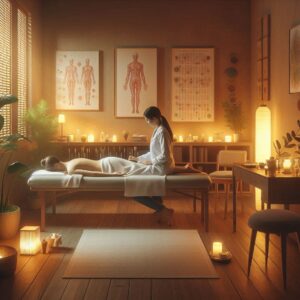Harness the Transformative Benefits of Acupuncture to Effectively Overcome Insomnia
Insomnia is not merely a fleeting issue; it represents a significant sleep disorder that can deeply impact your daily routine by creating obstacles in falling asleep, maintaining uninterrupted slumber, or achieving the profound, restorative sleep necessary for overall health. This condition can arise as a short-term challenge lasting just a few nights, or it can escalate into a chronic problem that persists for months or even years. A multitude of factors, including stress, ongoing worry, underlying depression, erratic sleep schedules, certain medications, excessive caffeine consumption, and various medical ailments, can all trigger insomnia. By identifying these potential causes, you can formulate effective treatment plans that not only restore healthy sleep patterns but also enhance your overall well-being and quality of life.
The ongoing battle against inadequate sleep can lead to serious ramifications for both your physical and emotional health. Chronic sleep deprivation can severely weaken the immune system, raising the risk of severe health issues such as cardiovascular diseases, increased risk of diabetes, and weight gain linked to obesity. Additionally, cognitive functions may suffer, resulting in challenges with focus, memory, and decision-making. On an emotional level, the effects can manifest as heightened anxiety, persistent depression, mood fluctuations, and irritability, which can significantly impact mental well-being. Therefore, it is crucial to identify and address the underlying causes of insomnia to mitigate these harmful health effects and restore a sense of wellness.
Understanding the Complexities of Insomnia and Its Profound Health Implications
- Insomnia is a multifaceted sleep disorder characterized by difficulties in falling asleep, remaining asleep, or waking too early, which can greatly impair your overall health and productivity.
- This condition can originate from a variety of sources, including stress, anxiety, depression, inadequate sleep hygiene, and specific medications, all of which can disrupt normal sleep patterns.
- Long-term sleep deprivation can severely undermine your health, leading to a compromised immune system, an increased likelihood of chronic diseases, decreased cognitive abilities, and emotional instability.
- Acupuncture can improve sleep quality by activating specific acupoints, facilitating the balance of the body’s energy flow and promoting relaxation.
- A wealth of research confirms that acupuncture can substantially enhance sleep quality and alleviate a range of symptoms associated with insomnia.
- This time-honored practice effectively addresses insomnia by reducing anxiety, promoting relaxation, and restoring balance to the body’s energy systems.
- Studies indicate that acupuncture may boost melatonin production, assist in regulating the circadian rhythm, and improve overall sleep quality.
- Common acupoints employed in treating insomnia include Shenmen, Sishencong, Anmian, and Yin Tang, each recognized for their therapeutic efficacy.
- Experienced practitioners utilize fine needles to target specific points, encouraging tranquility, alleviating stress, and enhancing sleep quality.
- Acupoints such as Shenmen are renowned for their calming properties, while Anmian is particularly effective in soothing the mind and promoting restful sleep.
- Traditional Chinese medicine underscores the importance of maintaining a balanced energy flow and harmony between yin and yang to facilitate quality sleep.
- Incorporating herbal remedies like chamomile, valerian root, and lavender, along with dietary recommendations for warm, easily digestible foods, can significantly boost sleep quality.
- Utilizing traditional Chinese medicine practices, including acupressure, herbal treatments, and Qi Gong, can complement acupuncture in managing insomnia.
- During an acupuncture session focused on insomnia, practitioners perform a comprehensive assessment of your sleep habits, lifestyle choices, and overall health status.
- The insertion of fine needles into specific acupoints is aimed at inducing relaxation, mitigating stress, and enhancing overall sleep quality.
- Multiple sessions, typically spread over several weeks or months, may be essential to achieve optimal results in effectively managing insomnia.
- Creating a conducive sleep environment is essential; reducing noise and light disturbances, ensuring a comfortable room temperature, and employing relaxation techniques such as meditation or deep breathing can significantly enhance sleep quality.
- Establishing a consistent sleep schedule, steering clear of caffeine and screen exposure before bedtime, and engaging in regular physical activity can greatly improve sleep quality.
- Implementing stress-reduction techniques such as yoga, meditation, or tai chi can further boost the effectiveness of your insomnia treatment.
- Working in collaboration with healthcare professionals, including psychologists, nutritionists, or sleep specialists, can successfully integrate acupuncture with other insomnia management strategies.
- Complementary therapies, including yoga, meditation, or massage, can enhance relaxation, alleviate stress, and improve overall sleep quality.
- Addressing underlying health issues such as anxiety, depression, or chronic pain is crucial for holistic relief from insomnia.
 Discover How Acupuncture Significantly Improves Sleep Quality
Discover How Acupuncture Significantly Improves Sleep Quality
Acupuncture has long been a fundamental aspect of traditional Chinese medicine (TCM), revered for its calming effects and its ability to promote restorative sleep. This holistic approach focuses on regulating the body’s energy flow, or qi, by stimulating specific acupoints. By positively impacting the nervous system, reducing levels of stress and anxiety, and rectifying internal imbalances contributing to insomnia, acupuncture can dramatically enhance sleep quality. This ancient practice not only reduces the frequency of nighttime awakenings but also cultivates a deep sense of relaxation and well-being, maximizing the restorative benefits of sleep.
A considerable body of scientific research and clinical trials consistently underscores the positive effects of acupuncture on sleep quality. For instance, a notable study published in The Journal of Alternative and Complementary Medicine found that participants suffering from insomnia experienced significant improvements in their sleep quality following acupuncture treatment. Moreover, research featured in the Journal of Sleep Research confirmed that acupuncture effectively reduced insomnia severity while enhancing overall sleep quality. These compelling findings affirm acupuncture’s potential as a safe, natural therapeutic option for individuals facing sleep disturbances.
Identifying the Most Effective Acupuncture Points for Enhancing Sleep Quality
Skilled acupuncturists strategically focus on specific acupoints to effectively combat insomnia and improve sleep quality. These acupoints play a vital role in addressing sleep-related challenges. For instance, the Shenmen point, located on the wrist, is well-known for its soothing effects on both the mind and body. Another crucial point, Sanyinjiao, positioned on the lower thigh, is believed to nourish blood and yin, leading to reduced anxiety and improved relaxation. The Anmian point, located just behind the ear, is frequently utilized to alleviate insomnia and foster a peaceful night’s rest. Additionally, the Yintang point, situated between the eyebrows, is recognized for its calming effects on mental clarity and tranquility.
During acupuncture sessions, practitioners carefully insert small needles into the skin at precise depths to effectively stimulate these specific points. This targeted stimulation is thought to help regulate the body’s energy flow, promoting a sense of balance and harmony. Consequently, many individuals report a significant reduction in insomnia symptoms and a marked improvement in sleep quality following treatment.
Delving into the Holistic Principles of Traditional Chinese Medicine to Enhance Sleep
Traditional Chinese medicine (TCM) embraces a holistic approach to health and wellness, recognizing the intricate connections between the body’s systems and emphasizing the importance of balance for optimal health. TCM principles regarding sleep highlight the necessity of restoring internal harmony to facilitate restful slumber. Herbal remedies are often recommended to correct imbalances that lead to sleep disturbances. Herbs such as valerian root, chamomile, lavender, and passionflower are cherished for their calming properties, aiding in achieving deeper, more restorative sleep. These natural remedies are believed to promote physical relaxation and improve overall sleep quality.
In practice, TCM practitioners often provide dietary suggestions designed to support and enhance sleep quality. Individuals grappling with insomnia are typically encouraged to consume foods that nourish the blood and yin. This may include dark leafy greens, nuts, seeds, and seafood, all of which contribute to overall health. Additionally, practices like Qigong, tai chi, and acupressure, along with other TCM techniques, can effectively alleviate insomnia by promoting relaxation, reducing stress, and enhancing overall well-being, ultimately leading to improved sleep quality.
 What to Expect During Your Initial Acupuncture Session for Insomnia Relief
What to Expect During Your Initial Acupuncture Session for Insomnia Relief
Upon arriving for your first acupuncture session aimed at insomnia relief, the acupuncturist will conduct a comprehensive evaluation of your sleep patterns, overall health, and any underlying factors that may be contributing to your sleeplessness. Using their expertise, the acupuncturist will formulate a personalized treatment plan that caters to your specific needs and circumstances, ensuring a tailored approach to your insomnia management.
The acupuncture treatment process involves the gentle insertion of fine needles into designated points on your body. Patients are typically encouraged to relax for 20 to 30 minutes while the needles remain in place. During this interval, individuals may experience a slight tingling sensation or mild discomfort; however, the overall experience is often described as calming and soothing, fostering an ideal environment for sleep.
The timing and frequency of acupuncture sessions may vary depending on the severity of insomnia and individual reactions to the treatment. While some patients notice enhancements in their sleep quality after just a few sessions, others may require ongoing treatment to achieve more sustainable benefits.
Implementing Positive Lifestyle Adjustments to Maximize Acupuncture’s Impact on Insomnia
In addition to acupuncture, adopting certain lifestyle changes can significantly enhance your sleep quality. Creating a sleep-conducive environment is crucial for optimizing your overall sleep experience. This entails ensuring your bedroom is dark, quiet, and serene, using comfortable bedding and pillows, and establishing a calming bedtime routine that signals to your body that it’s time to unwind for the night.
Embracing healthy habits can dramatically improve sleep quality. This includes adhering to a consistent sleep schedule, avoiding caffeine and electronic devices in the hours leading up to bedtime, incorporating regular physical activity into your daily routine, and practicing relaxation techniques like deep breathing or meditation to soothe the mind and prepare for rest.
Employing effective stress management techniques can greatly enhance the results of acupuncture treatment for insomnia. Engaging in activities such as yoga, meditation, or massage therapy can alleviate anxiety and promote relaxation. These practices provide essential support to help you de-stress, making it easier to both fall asleep and maintain sleep throughout the night.
 Integrating Acupuncture with Other Effective Approaches for Comprehensive Insomnia Management
Integrating Acupuncture with Other Effective Approaches for Comprehensive Insomnia Management
With the assistance of a skilled practitioner, acupuncture can serve as a crucial element of an all-encompassing strategy for managing insomnia, providing vital relief for those struggling with sleep disorders. Collaborating with other healthcare professionals, such as primary care physicians and mental health specialists, is essential for offering holistic care to individuals experiencing insomnia.
By merging acupuncture with complementary practices such as yoga, meditation, and massage therapy, individuals can develop a comprehensive approach to foster relaxation and reduce stress, leading to improved sleep quality. These methods can be seamlessly woven into a personalized treatment plan designed to address each individual’s unique needs, ensuring they feel supported and understood throughout their journey.
Moreover, it is critical to address any underlying health issues that may be exacerbating insomnia. Treating chronic pain, anxiety, depression, or other medical conditions that interfere with sleep quality is integral to the overall treatment process. Individuals who embrace a holistic approach to their health and well-being can significantly enhance their sleep quality and overall quality of life.
Ultimately, insomnia can have profound effects on both physical and emotional well-being, highlighting the necessity of exploring effective treatment options. A knowledgeable practitioner can utilize acupuncture to improve sleep quality by addressing imbalances within the body and fostering a sense of tranquility. By integrating lifestyle modifications, principles of traditional Chinese medicine, and other complementary therapies, acupuncture can considerably enhance both sleep quality and overall well-being. This holistic approach offers hope and optimism for individuals seeking relief from insomnia.
 Frequently Asked Questions About Acupuncture and Its Effectiveness in Insomnia Relief
Frequently Asked Questions About Acupuncture and Its Effectiveness in Insomnia Relief
What Is Acupuncture and How Can It Help Treat Insomnia?
Acupuncture is a time-honored practice rooted in traditional Chinese medicine, wherein skilled practitioners insert thin needles into specific points on the body. This technique encourages the flow of energy and enhances the body’s natural healing processes, aiding in the relief of various health issues, including insomnia.
How Is Insomnia Classified in Medical Terms?
Insomnia is identified as a sleep disorder that disrupts the capacity to fall asleep, maintain sleep, or achieve restorative sleep. This persistent condition often results in daytime fatigue and diminished functionality, making it vital to seek effective treatment solutions.
In What Ways Does Acupuncture Alleviate Symptoms of Insomnia?
Acupuncture has been shown to positively impact insomnia by restoring equilibrium to the body’s nervous system, alleviating stress and anxiety, and inducing a state of relaxation. This approach ultimately enhances both the quality and duration of sleep, establishing acupuncture as a valuable treatment alternative.
Are There Scientific Studies Supporting the Effectiveness of Acupuncture for Insomnia Relief?
A variety of studies suggest that acupuncture can improve sleep quality and alleviate insomnia symptoms. While evidence supports its benefits, further research is necessary to solidify these findings and arrive at more definitive conclusions regarding its efficacy.
What Can I Expect During an Acupuncture Session Focused on Insomnia?
During an acupuncture session, a skilled practitioner carefully inserts slender needles into specific points on your body associated with promoting sleep and relaxation. The needles are typically left in place for 15 to 30 minutes while you unwind and embrace a state of tranquility.
Are There Any Side Effects Linked to Acupuncture for Insomnia?
When performed by a trained and experienced practitioner, acupuncture is generally considered safe. Nonetheless, some individuals may experience minor side effects such as tenderness, discoloration, or slight bleeding at the sites where needles are inserted.
Can Acupuncture Function as an Independent Treatment for Insomnia?
Acupuncture can be an effective treatment for insomnia when integrated with complementary strategies such as lifestyle changes, relaxation techniques, and cognitive behavioral therapy for insomnia (CBT-I), creating a comprehensive treatment plan tailored to individual needs.
How Many Acupuncture Sessions Are Generally Required to Notice Improvements in Insomnia?
The number of acupuncture sessions needed to see improvements in insomnia varies based on individual circumstances and symptom severity. Many individuals report enhancements after just a few sessions, while others may require ongoing treatment for sustained benefits.
Provided By:
References
If You Only Get 3 Hours of Sleep One Night – What Happens – Themes Quality. https://www.themesquality.com/what-happens-if-you-only-get-3-hours-of-sleep-for-one-night/
Sleep Better with 30 Essential Oils: A Natural Remedy for Insomnia and Restless Nights – Hotnewamapiano. https://hotnewamapiano.com/2023/02/11/sleep-better-with-30-essential-oils-a-natural-remedy-for-insomnia-and-restless-nights/
Migraines Helped by Acupuncture. https://www.ncbi.nlm.nih.gov/pmc/articles/PMC3291665/
The Article: Acupuncture Techniques for Improving Sleep Quality appeared first on Acupuncture Blackpool.
The Article Acupuncture Techniques for Better Sleep Quality appeared first on https://mcrtherapies.com
The Article Acupuncture Techniques for Better Sleep Quality Was Found On https://limitsofstrategy.com
The Article Acupuncture Techniques to Improve Sleep Quality First Appeared ON
: https://ad4sc.com


This post truly resonates with me, as I’ve experienced the struggles of insomnia firsthand. It’s interesting how widely misunderstood this condition is; many people view it as a simple issue of sleep habits when, in reality, it can be intertwined with so many aspects of our lives.
Your post really resonates with me, especially considering how prevalent insomnia seems to be these days. Just a few months ago, I found myself in a similar situation where I was tossing and turning almost every night, dragging through my days like a zombie. It’s strange how something as simple as sleep can turn into such a complex issue, right? I personally used to ignore it, thinking it was just a phase or that I could power through with coffee. But after a while, it became clear that my lack of sleep was influencing not just my energy levels, but my mood and productivity too.
I really appreciate how you’ve highlighted the multifaceted nature of insomnia and its ties to so many aspects of our lives. It’s interesting to think about how our modern lifestyles, with all the stress and constant connectivity, could be contributing to this issue for so many people.
You’ve hit the nail on the head with the connection between our lifestyles and insomnia. It’s a bit like that classic horror movie trope—if you open the fridge at midnight, you risk awakening the snacks that threaten your diet. Our modern lives, packed with endless emails, notifications, and the delightful chaos of social media rabbit holes, can turn our brains into a hyperactive hamster on a wheel.